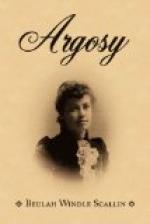It was a strange hour for confession, and there must have been some special reason for it. They were strangely dressed, too, in their silken cloaks and hoods, as if they belonged to some religious order, or some charitable institution. We wondered much.
When the west doorway had closed behind them, and not before, the priest left his box, and we started as we recognised our fellow traveller. How came it that he was confessing so soon after his arrival, or confessing at all, in a church to which, as far as we knew, he was not attached? His tall and portly form looked magnificent and commanding as he stepped forth into the shadowy aisle, and, preceded by a verger, or suisse, bearing a lighted flambeau and a staff of office, was soon lost in the sacristy.
We lost ourselves in dreams. It is wonderfully refreshing to fall out of the influence of the crowded and commonplace world into these silent resting-places, which whisper so much of Heaven, and seem to breathe out a full measure of the spiritual life. They seem steeped in a religious, a celestial atmosphere; just as, on the Sabbath, in quiet country places, far from crowded haunts, surrounded only by the beauties of nature, there seems a special peace and repose in earth and sky, and people say to each other, “One feels that it is Sunday.”
But we were very nearly in danger of prolonging our dreams until the night shadows passed away, and the day-dawn broke and lighted up that far-off east window. H.C. was a very broken reed to trust to on such occasions. He was not only wrapped in visions—his spirit seemed altogether to have taken flight. I was rudely brought back to earthly scenes and necessities by hearing the key hastily turned in the west door by which we had entered, and the verger commencing to retrace his steps, preparatory to putting out the lights and departing himself through the sacristy.
We hurried up to him, having no mind to pass the night in silent contemplation, with the pavement for couch and a stone for pillow. The influence we had just experienced must have given us “pallid sorrowful faces,” for the verger almost dropped his torch, and his keys fell to the ground and awoke mysterious echoes in the distant arches.
It was a weird, wonderfully expressive scene. The torch threw lights and shadows upon aisle and arch, which flickered and danced like so many ghosts at play, until our nerves felt overwrought and our flesh creeped. In our present mood it all seemed too strange, too mysterious for earth. We felt as if we had joined the land of shadows in very truth. But the verger’s voice awoke us to realities: a very earthly voice, unmusical and pronounced, not at all in harmony with the moment. It grated upon us; nevertheless, under the circumstances, it was good hearing.




